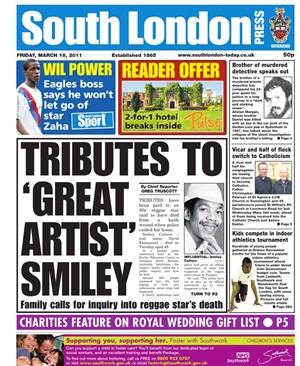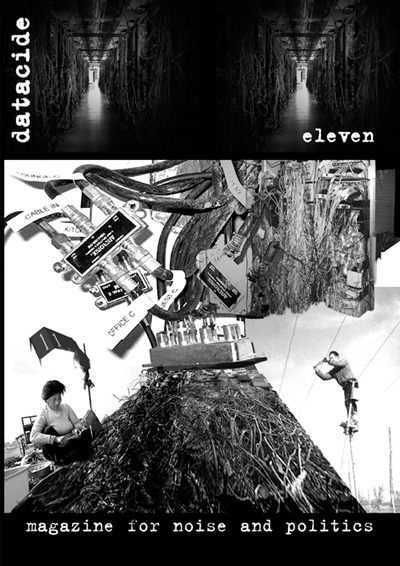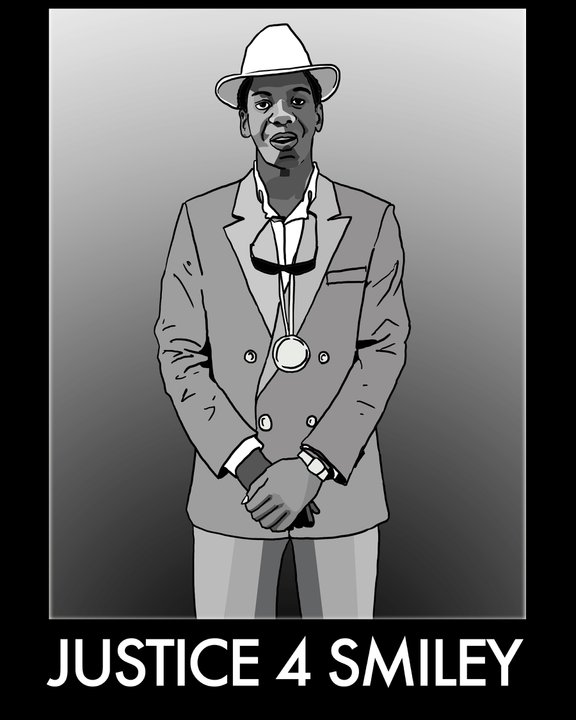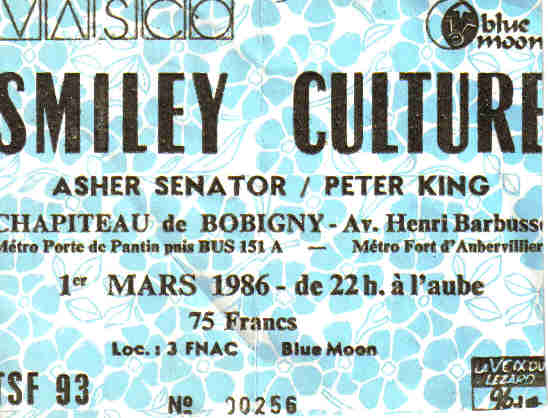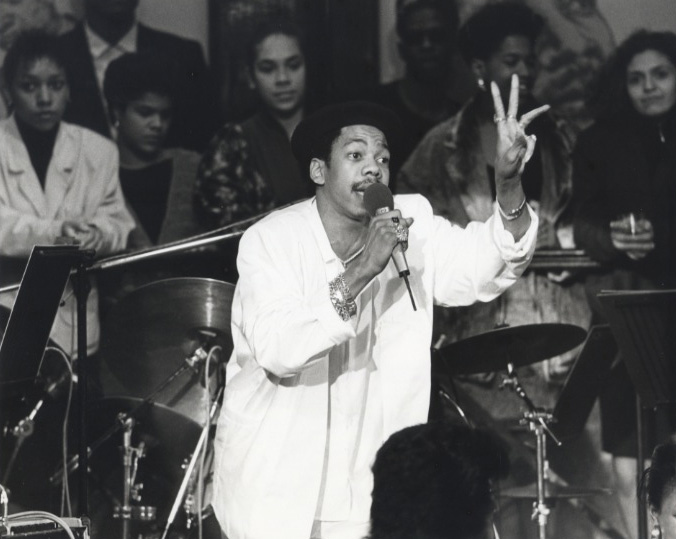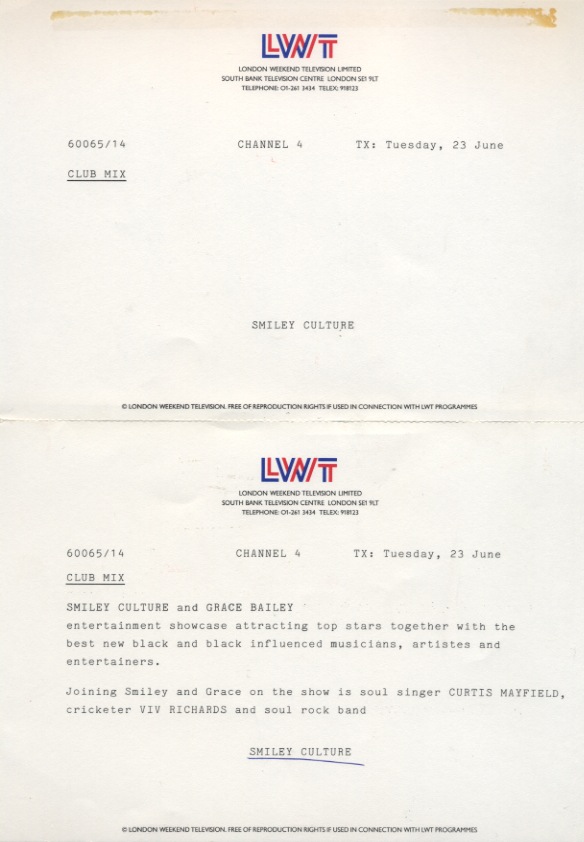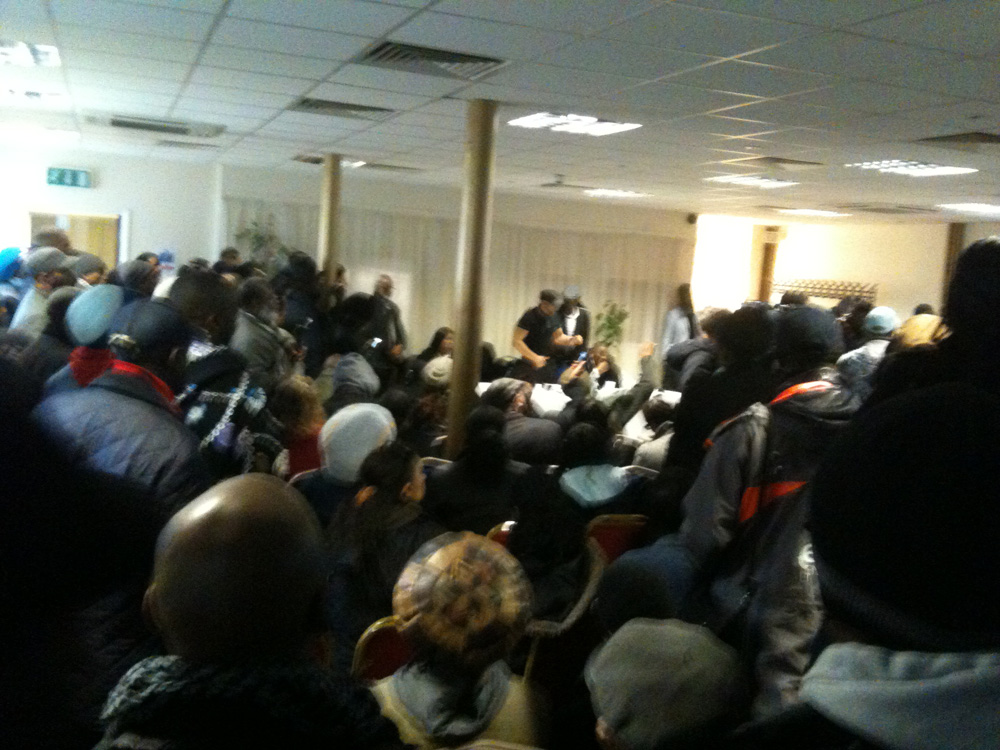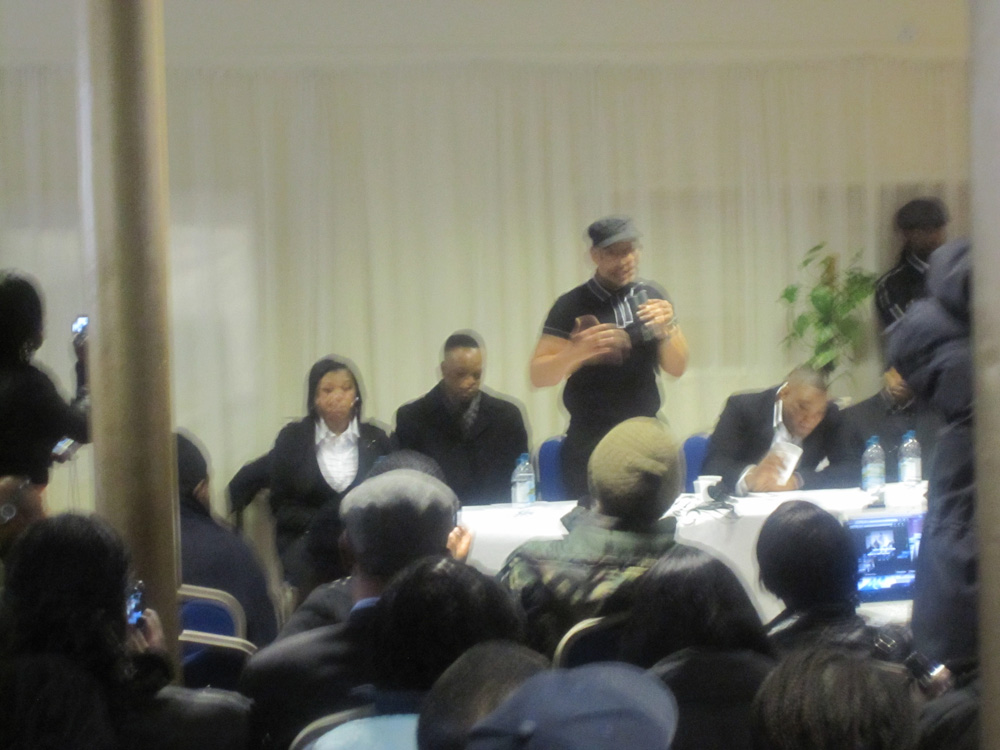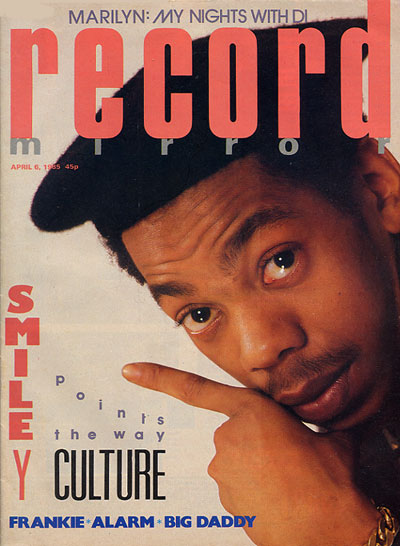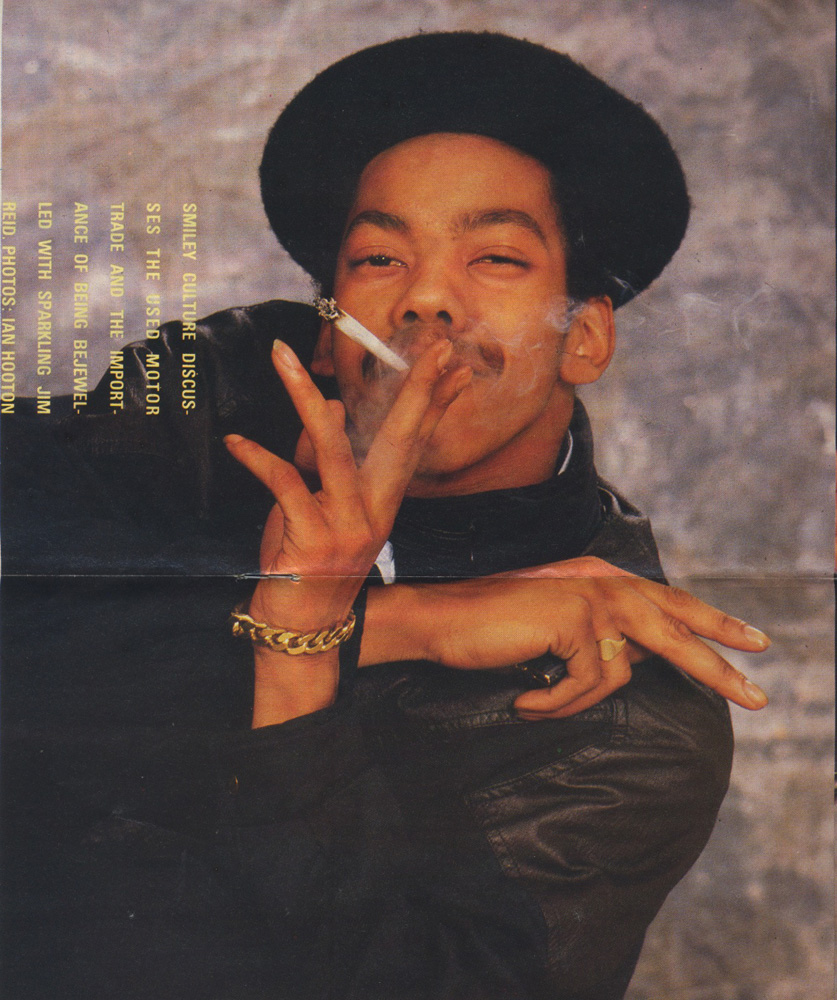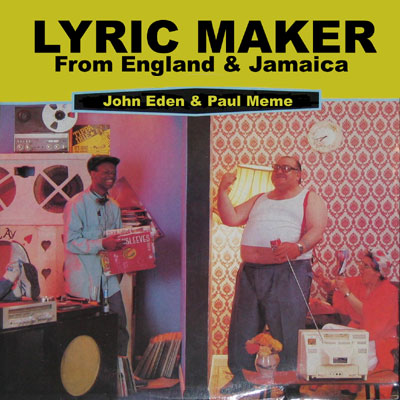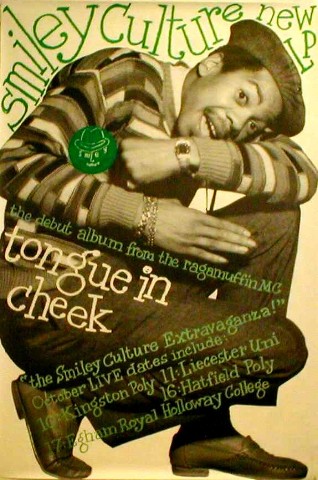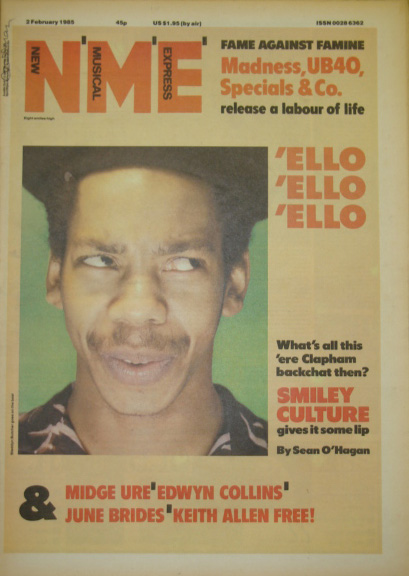
1st OFFENDER
NAME: Smiley Culture
CHARGE: Dread Bodily Harm
SENTENCE: A Spell In The Charts
REPORT: Sean O’Hagan
MUGSHOT: Bleddyn Butcher
NO SOONER has Smiley Culture arrived to greet the NME posse than he is apprehended: the boys in the blue don’t feature this time round. but over-zealous fans mean a long wait whilst our hero signs records, shakes hands and chats with every well wisher.
As we step across Clapham Junction a few hours later it’s the same story.
“Yow Smiley Culture!”.
“Wha’ppen mi boss!”.
“Awoah Smiley Culture. ya cool!”
Round here the local hero has become a bonafide star and, true to his well chosen moniker. he plays the part of beaming ambassador — bedecked in safari shirt and matching strides— with considerable ease. In the local car park his beret-topped frame attracts the attention of the attendant.
“Hey you ain’t Smiley Culture are you? Do the honours and sign your autograph on this piece of paper.”
With his second single. the engagingly subversive ‘Police Officer’, riding high in the popular charts. the 22-year-old reggae toaster – or to use the current coinage, MC – has leapt from dancehall renown to national stardom. Down Clapham Junction way Smiley has always had more than a few youthful admirers whilst his roots popularity – originally based on his sound system reputation as a sure fire crowd pleaser – made his debut single. the excellent ‘Cockney Translation’, a reggae best seller.
Now, with a couple of Top Of The Pops appearances behind him, his face – not to mention that voice – is familiar throughout Britain: a fact that amuses him no end.
“I think the audience for ‘Police Officer’ is made up of all sorts of people, from youths who probably can’t understand what I’m saying to older people who definitely can’t understand what I’m saying!”
Some people are only too eager to dismiss both ‘Cockney Translation’ and ‘Police Officer’ as novelty records, which is as good a way as any to finger something that relies for its impact on wit, originality and a fair degree of craftsmanship. I mean. these qualities are certainly ‘novel’ in terms of the usual hit song content. It’s certainly a surprise to hear reggae. specifically of the DJ variety, on daytime radio.
That said. Smiley Culture has graduated from a scene that is notoriously insular and seldom takes heed of outside factors like commerciality.
“It is I Smiley Culture with the mike in a me hand
Me come to teach you right and not the wrong . . .”
MANY WOULD claim that to hear reggae properly you have to frequent the dancehall circuit and experience the serious application of bass’n treble or the expertise of the best and baddest MCs like Josey Wales or Charlie Chaplin. One thing is for certain: this is where reggae is showcased in its most raw and unadulterated form and, when the dance is ram and the bass is shaking the floorboards, you don’t need a heedful of sensi to feel the sensory overload.
This was the breeding ground for the latest and best wave of young MCs led by Smiley, his friend Asher Senator and Papa Levi. As older sound systems fell from grace the black youth flocked to the up and coming contenders like Saxon Sound: it was the DJs who carried the swing. and old traditions like loyalty to a particular operator, were broken. Smiley’s tried them all.
“I have chatted with virtually every sound in London and a few outside as well. Mostly sparring with Asher or chatling on my own. butt never like to stay with one particular one for too long – except Buchanan where we start from.”
For one so young, Smiley has been around for a surprising seven years, first getting the bug from what he terms “the lickle musical conflict that I Roy. U Roy, Jazzbo and dem, had going”. As a 15-year-old he spent hours practising at home before building up sufficient bottle to face the fickle, no-nonsense dancehall audience. Then it was crowds of two or three hundred and a few bigger sessions which proved invaluable for situations “like Carnival where we touched an audience of ’bout 10.000- but by that time we didn’t fear any crowd”. Somewhere along the way the “fast style” was born (the full rundown is given on Asher Senator’s ‘Abbreviation Qualification Fast Style Origination’ 45, complete with an excellent illustration of the form) and Smiley cites Peterkin – Papa Levi’s sparring partner – as the creator.He is also eager to explain how his own style differs.
“Personally I would call our style ‘continuous’. y’know? I mean. Peterkin and dem was fast hut it was hard to keep that up for a whole session, so our style – me and Asher – is making continuous lyrics that last longer and are about one particular subject.”
It was whilst performing ‘Cockney Translation’ in this very manner that Smiley came to the attention of Fashion Records and was offered the chance to record his wit and wisdom. It was a great debut by any standards with Smiley’s semantic overview contrasting the multifarious catchphrases pertaining to the cockney and the dreadee, with the lyrical invention riding on a hard and sparse rhythm.
Was it the same version that he performed to the live audiences?
“Not really. See. the idea came from the previous thing I had worked on called ‘Smiley Culture Have Nuff Different Personality’. In that song I had lots of different accents but I found that the Cockney part of the song worked best. ‘Cockney Translation’ was something I had scribbled down as a headline for that particular bit but then I got to like it more . . . the first thing that actually came about was the line ‘Cockney not a language it is only a slang’- that came before anything.”
Despite its massive roots appeal. and matching sales, ‘Cockney Translation’ wasn’t picked up by the radio stations: something which leaves Smiley unruffled.
“I think it probably paved the way for the second one – people need a little time to check for something new.”
Perhaps its imminent re-release will alert people to Smiley’s acute and detailed sense of observation that fires the song. His understanding of street terminology is well crucial.
“Well, as far as I’m concerned that’s the proper way to express yourself. Where I’m coming from, that’s how we chat. yknow… that’s how things are supposed to be said.” he laughs.
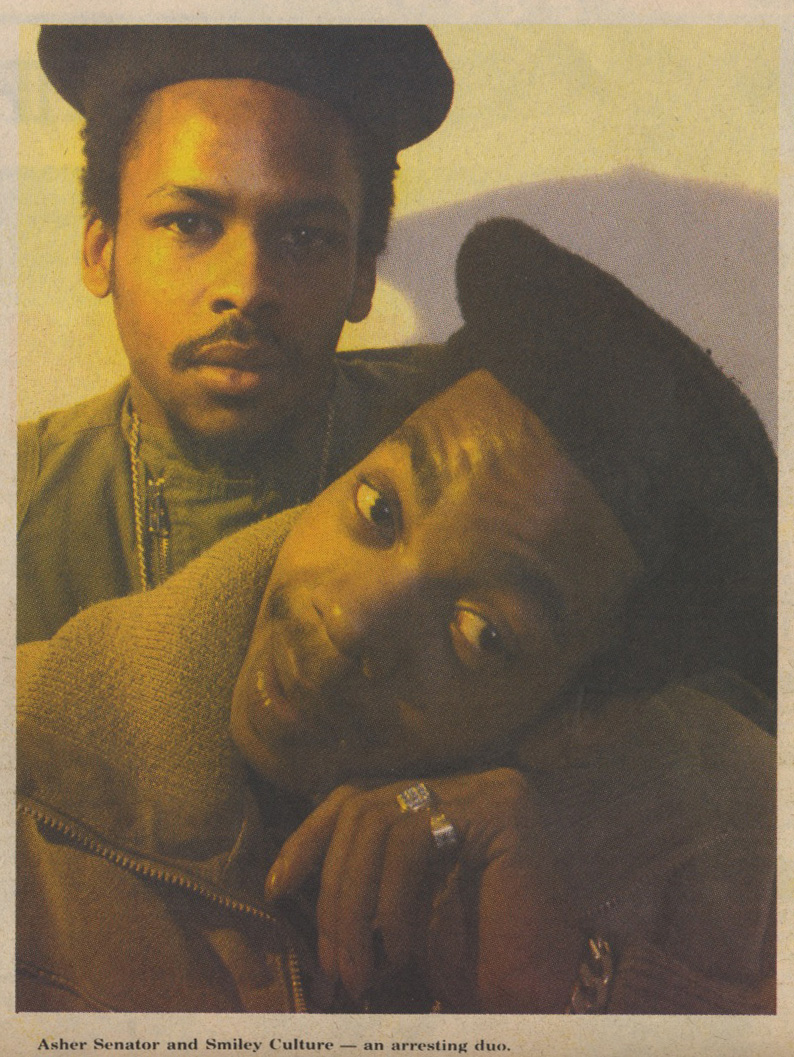
IF THE success of his debut single bowled him over he really wasn’t prepared for the massive impact of ‘Police Officer’. For one thing he was sure the BBC would avoid the record because it sends up of the boys in blue, and advocates ‘ganja’
“Well, there was words about it yknow: there was definite words in that department.” he grins. “I was surprised, really surprised, when they decided not to ban it. I suppose a lot of people liked it but a lot of people liked ‘Cockney Translation’ and if never got played much.”
I put it to him that ‘Police Officer’ didn’t really get that much airplay until it had actually charted.
“True. It didn’t get played as much as it should, I would say respect is due to Capital Radio and John Peel, plus Janice Long played it daytime.”
‘Police Officer’ owes much of its appeal to the irreverent narrative wherein the wideboys cheeky bravado outwits the cloddish coppers (it’s great how they indulge in half-baked copper-speak: “Just give us what we want – the real sensimania.” …and “You what? Did you do that record ‘Cockney Translator’?”).
Underneath this. however, is a serious commentary on the problem of police harassment faced by black kids. For Smiley, the personal memory is anything but humorous.
“Well, the serious side is always there y’know? ‘No bother give me producer’: stop putting on the pressure. seen? But I’ll tell you something: when I originally was writing that song, actually sitting down and writing it, it was with grief, with rough feelings towards the police.”
It was originally meant to be a much heavier attack then?
“Put it this way: it was more leaning towards seriousness. right? I mean, I personally have not been stopped more than four or five times – and a lot of youths are stopped all the time – but I don’t think there is anything, any one thing that has affected me like that. Nothing has happened to me personally that could produce a song like that. See, when it’s your own experience – even though you hear about it all the time – when it happens to you . . .(pause) … I mean it’s something I’m sure I’ll never forget.”
What kind of reaction did the song get when you first played it in dancehalls?
“Boy – it jus’ rip the dancehall down. yknow? I tell you: that audience knew what I meant alright!” he laughs. “Now it’s taken off like this I figure maybe more people than I thought can check for what I’m saying.”
With some relish, Smiley recalls his last brush with the law which occurred alter ‘Police Officer’ had made the charts and concerns his new motor – a Honda, with one previous owner.
“Yeah, well this other guy. who previously had the car. was some sort of villain right? Now. I wasn’t too quick in sending off the papers to register the car in my name so when they stop me it’s still registered in his name and I’m driving round in it. It all turned out well ‘cos when they found out it was me they stopped, they were real glad to have met me more than anything else. They even apologised!”
NOW THAT ‘Cockney Translation’ is to resurface. the young supa has a chance to take a breather and maybe start thinking about the LP Fashion are eager to release, although, when pushed. Smiley admits to having written nothing “for records”. He has his notebooks though. with snatches of lyrical inspiration on a multitude of themes.
“At one time I had enough ideas for 25 styles a year!”
I asked if he sees any affinity in what he’s doing with the jive merchants of the rap scene. Could his records pave the way for a wider acceptance of reggae toasting in the same way that something like ‘The Message’ had for rapping?
“Well, they are dealing in lyrics and I check for anything that concerns lyrics. I would like to try and cut a rap-style record in the future, it would be interesting to bring the two styles together.”
He also plans to team up with his mate – Asher Senator – to cut some plates in a “combination- stylee” the first recorded evidence of this fruitful liaison is on the ‘Great British MCs’ compilation Fashion will release next month: ‘Its Coming Down (Our Combination)’ is the track to look for.
ALTHOUGH SMILEY Culture seems, outwardly, at least, to be enjoying every moment of his new-found stardom, he is becoming increasingly aware of the demands his fame places on him. On the dancehall scene he was very much his own man: a star on his own terms and one who loved the runnings of that particular set-up, indeed depended on them for his inspiration. Now, it isn’t that straight forward and when I ask him if his success will have a lasting effect in terms of establishing British reggae as an enduring force, he is distinctly cagey. Probing further I wonder if he can sustain his current momentum?
“That’s down to whether I want to have a lasting effect or not.” he answers without hesitation. Surely you do?
“Well . . . this stardom thing is a whole different sort of life and I haven’t really sat down and worked out if it’s the sort of thing I want – as an individual.”
You think the pressures could change you as a person?
“There is a certain amount of pressure already ‘cos you have to try and know what the people want. I mean ‘Cockney Translation’ and ‘Police Officer’ were what I wanted but I didn’t expect to be feeding such a large audience. That responsibility isn’t easy for some people… I wouldn’t like to predict how it will go”
“Personally. I’d like to go on making records for myself but that’s not the way this business works. So. as an individual, have to stand back and think how far I want to get involved in the music business. I don’t know if I want it to be a full time thing or a long term thing. I’m just sussing out certain aspects and wondering if this is what I really want. I’d rather be a normal person than someone to be looked at. . . or looked up to.”
IT WAS Sly Stone who declared ‘Everybody Is A Star’ and one gets the feeling that Smiley Culture has always been a bit special. This natural ability has taken him far but the demands made on his time and energy are beginning to dampen his enthusiasm and drag him away from the “yardee” lifestyle of his roots.
He has been booked for half a dozen TV appearances when he’d rather be raving down The People’s Club and the thought of cutting a whole LP doesn’t hold half the attraction of chatting up a storm live.
“I mean, you get the freedom to do lots of things you could never do before but. at the same time, there are things I really used to enjoy that I can’t do now. As it gets bigger it gets harder.”
For now he has the measure of his success – just. Before we leave he is eager to ensure that we emphasise the amount of burgeoning talent there is on the present sound system circuit.
“I tell you there’s a few youths, just 16 or 17 right, and they are good: I mean good. MCs like Paul Culture and Militant Mikey! A singer called Stewey Ranking and some women too – Lorna G, Momma Ali, Sister Candy and many more..
Anything else?
“Yeah. I’d just like to say that respect is due to all the people who buy my records and respect is even due to those who don’t ‘cos respect is due to each and every one. Seen?” Settlement!
